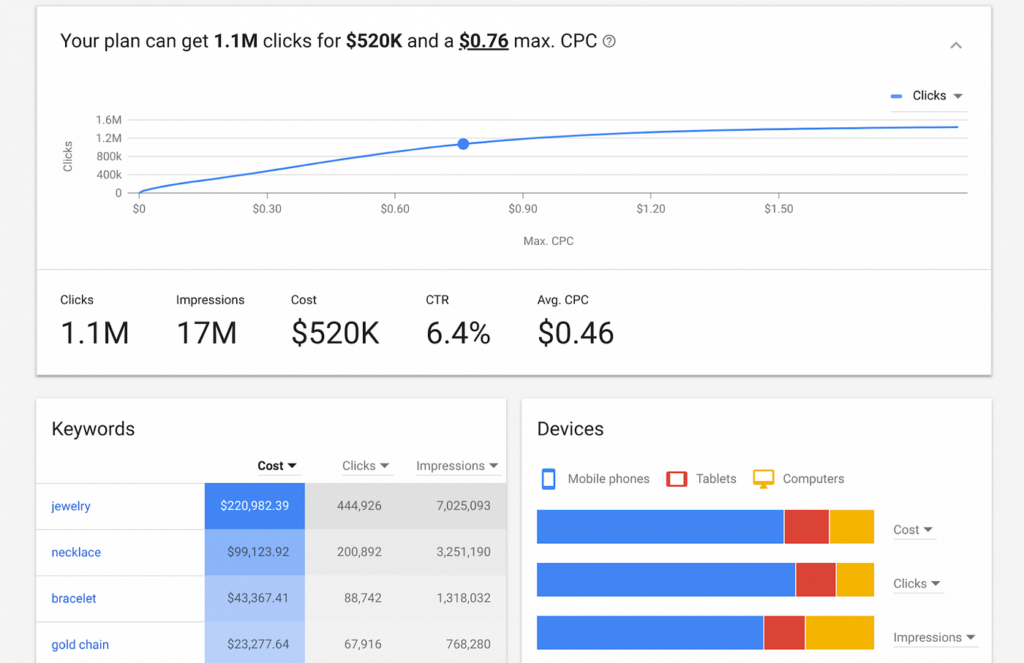Pay-Per-Click (PPC) advertising is a crucial aspect of digital marketing, allowing businesses to display ads and pay only when users click on them. Understanding the costs associated with PPC campaigns is vital for effective budgeting and maximizing return on investment (ROI).
Table of contents
Cost Per Click (CPC)
CPC is one of the most common pricing models in PPC advertising. It involves paying a certain amount each time someone clicks on your ad. The cost per click can vary based on factors such as industry competition and keyword demand.

Cost Per Mille (CPM)
CPM refers to the cost per thousand impressions. In this model, advertisers pay for every 1,000 times their ad is displayed, regardless of clicks. It’s prevalent in display advertising and can be cost-effective for brand exposure.

Cost Per Acquisition (CPA)
CPA pricing involves paying when a specific action, like a purchase or sign-up, is completed due to the ad. Advertisers only pay when the desired action is achieved, making it a performance-based model.

Factors Affecting PPC Costs
Various factors influence PPC expenses:
Keyword Selection and Competition
Highly competitive keywords tend to have higher CPC rates, impacting overall campaign costs. Strategic keyword selection is crucial for cost-effective campaigns.

PPC Ad Quality and Relevance
The relevance of your ad to the target audience and its quality score affect PPC costs. Well-crafted, relevant ads often achieve higher positions at lower costs.
Target Audience and Geography
Targeting specific demographics or geographic locations can impact costs. Advertisers might pay more to reach niche or competitive markets.
Average PPC Costs Across Different Platforms
Different advertising platforms have varying average PPC costs. Google Ads, Facebook, LinkedIn, and others have distinct pricing structures influenced by their audience and ad formats.

Strategies to Manage and Optimize PPC Expenses
Quality Score Improvement For PPC
Enhancing the quality score by optimizing landing pages and ad relevance can reduce CPC and enhance ad positions. Compelling ad copy can improve click-through rates, potentially lowering costs and boosting conversions.
| Strategy | Description |
| Quality Score Improvement | Enhancing landing pages and ad relevance leads to a higher quality score, reducing CPC and improving ad positions. |
| Ad Copy Optimization | Crafting compelling ad copy can elevate click-through rates, potentially reducing costs and increasing conversion rates. |
| Budget Allocation Techniques | Strategic allocation of budgets across campaigns and ad groups ensures efficient spending and maximizes return on investment (ROI). |
| Keyword Management | Continuous refinement and selection of high-performing keywords help in driving targeted traffic while minimizing unnecessary spending. |
| Ad Extensions Utilization | Leveraging ad extensions like sitelinks, callouts, and structured snippets can increase ad visibility, improving CTR and potentially lowering CPC. |
Calculating and Budgeting for PPC Campaigns
Understanding how to calculate PPC costs and setting realistic budgets is crucial. Factors like daily ad spend and campaign duration influence budgeting decisions. Exploring real-life examples of effective PPC budgeting strategies and their impact on campaign performance.
Determine Campaign Goals:
- Clearly define your campaign objectives (e.g., brand awareness, lead generation, sales).
- Align budget allocation with specific goals to optimize spending.
Understand Cost-per-Click (CPC):
- Calculate the average CPC for your industry and targeted keywords using tools like Google Keyword Planner or SEMrush.
- Consider variations in CPC based on ad position and competition.
Estimating Click-through Rate (CTR):
- Analyze historical CTR data or industry benchmarks to forecast the number of clicks expected per ad impression.
- CTR influences the number of clicks obtained within a specified budget.
Calculate Daily PPC Ad Spend:
- Determine the daily budget by multiplying the expected CPC by the estimated number of clicks per day.
- Adjust daily spend based on campaign performance and fluctuations in CPC.
Conclusion
Understanding the various PPC pricing models, factors influencing costs, and implementing effective strategies are key to managing and optimizing PPC expenses. Continuous monitoring and adaptation are essential for successful and cost-effective PPC campaigns.
Readmore : Advanced Email Marketing Strategies for Engagement
Read About: General PPC Statistics in 2021
FAQ’s
The cost of PPC can vary significantly based on factors like industry, competition, chosen keywords, and platforms.
To optimize PPC expenses, focus on improving ad quality and relevance. Enhance your ad copy to increase click-through rates and work on refining your keyword selection to target more cost-effective keywords
Several factors influence PPC expenses, but keyword competition and quality score significantly affect CPC rates. Highly competitive industries and keywords tend to have higher costs per click.
While PPC cost is a crucial aspect of campaign management, it’s not the sole determinant of success. A higher cost doesn’t always guarantee better results.


